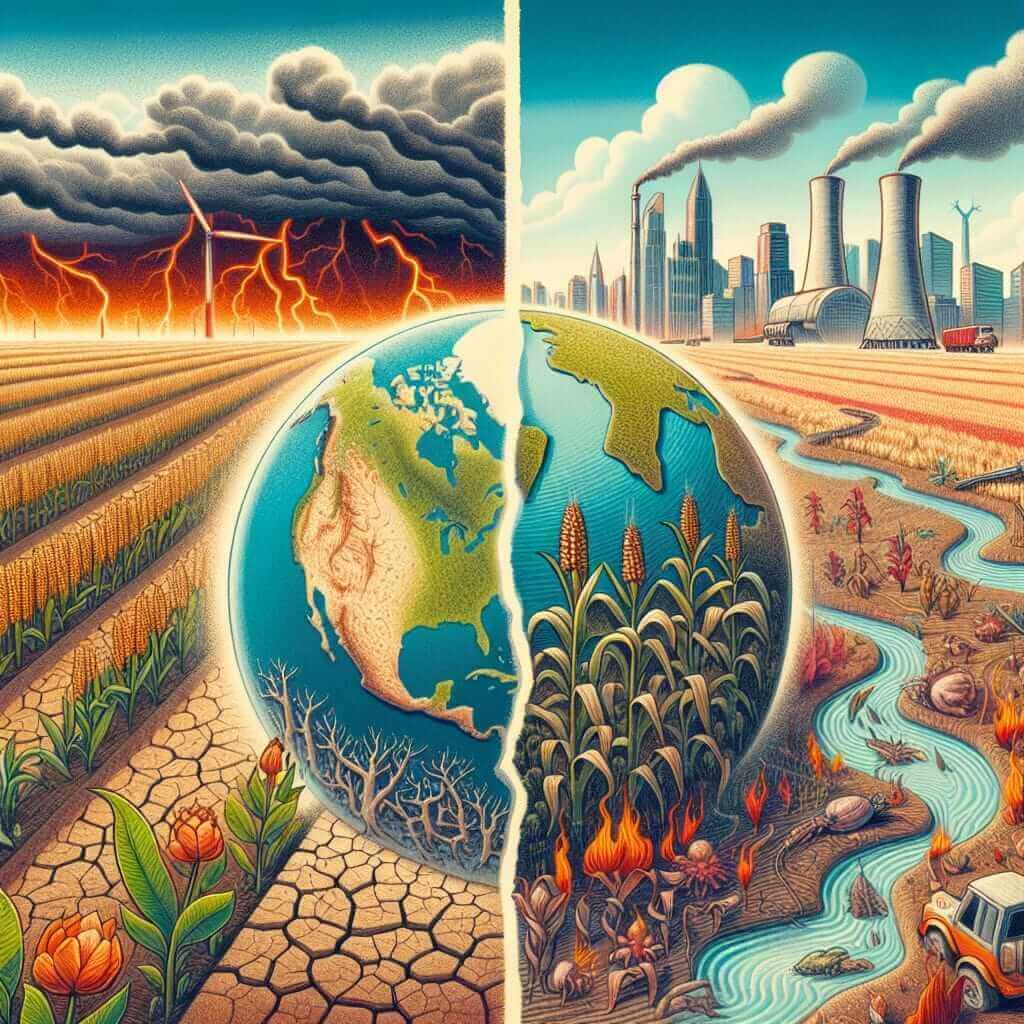Reading is a critical part of the IELTS test, designed to assess a candidate’s ability to understand and analyze written English. The IELTS Reading section includes a variety of question types, including multiple-choice, matching headings, and identifying information. One recurrent theme in IELTS Reading tasks is climate change, reflecting its significance and frequent discussion in media and academic fields. This article aims to provide an in-depth practice exercise focusing on the keyword “How is climate change affecting global agricultural yields?” and related semantic keywords. Such a topic is not only relevant but also likely to appear in future IELTS exams due to its global importance.
Main Content
Practice Reading Test on “How is Climate Change Affecting Global Agricultural Yields?”
Text (Medium Difficulty)
Climate change has emerged as a profound challenge to global agriculture, impacting crop production, livestock, and fisheries. The interplay of temperature changes, altered precipitation patterns, and increased frequency of extreme weather events is creating multiple stressors for agricultural yields worldwide.
For instance, rising temperatures can reduce crop yields directly by shortening the growing season and increasing the likelihood of heat stress, which can inhibit plant growth. In regions like Sub-Saharan Africa, where agricultural practices are heavily dependent on predictable weather patterns, any significant change can be disastrous. Statistical models predict that for every 1-degree Celsius increase in global temperature, substantial crop losses in staple grains such as wheat, rice, and maize could ensue.
Meanwhile, altered precipitation patterns can lead to severe water scarcity or waterlogging. Drought conditions exacerbate water scarcity issues, diminishing the availability of irrigation. The Horn of Africa has experienced recurrent droughts, decimating harvests and compelling pastoralists to travel further distances in search of pasture.
Furthermore, the increasing frequency and severity of extreme weather events, such as hurricanes, floods, and droughts, pose threats to livestock and agricultural infrastructure. The devastation of Hurricane Maria on Puerto Rico’s agricultural sector is a case in point, leading to significant losses in fruit and coffee plantations.
Fisheries are not immune to these impacts. Ocean warming and acidification disrupt marine ecosystems, leading to a decline in fish stocks and altering fishing dynamics. Coastal communities dependent on these fisheries are particularly vulnerable.
Addressing these challenges requires integrated strategies, including the adoption of climate-resilient crops, improved irrigation techniques, and comprehensive disaster management plans. International cooperation and funding are also crucial to support regions disproportionately affected by climate variability.
Questions
-
Multiple Choice
What is a direct effect of rising temperatures on crops?
- A. Lengthening the growing season
- B. Increasing heat stress
- C. Stabilizing weather patterns
- D. Reducing irrigation needs
-
Identifying Information (True/False/Not Given)
- The Horn of Africa has experienced a decrease in agricultural production due to recurrent droughts.
- Puerto Rico’s agricultural sector has benefited from Hurricane Maria.
-
Matching Sentence Endings
Match the beginning of the sentences with the correct ending.
- Drought conditions…
- Extreme weather events…
a. …lead to decreased availability of irrigation.
b. …pose threats to livestock and infrastructure. -
Summary Completion
Complete the summary using words from the text.
Climate change poses multiple challenges to agriculture by altering __ patterns, increasing extreme __ events, and directly impacting __ through temperature rises.
-
Short-answer Questions
- Which region’s agriculture is heavily dependent on predictable weather patterns?
- Name three staple grains affected by global temperature increases.
Answers and Explanations
-
Multiple Choice
- B. Increasing heat stress: The text clearly states that rising temperatures can lead to heat stress, which affects plant growth.
-
Identifying Information
- True: The text mentions that the Horn of Africa has experienced recurrent droughts that decimate harvests.
- False: Puerto Rico’s agricultural sector suffered significant losses due to Hurricane Maria, not benefits.
-
Matching Sentence Endings
- Drought conditions… a. …lead to decreased availability of irrigation.
- Extreme weather events… b. …pose threats to livestock and infrastructure.
-
Summary Completion
- Climate change poses multiple challenges to agriculture by altering precipitation patterns, increasing extreme weather events, and directly impacting yields through temperature rises.
-
Short-answer Questions
- Sub-Saharan Africa: This region’s agriculture relies on predictable weather patterns.
- Wheat, rice, maize: These are the three staple grains mentioned to be affected by temperature increases.
Common Mistakes
- Misinterpreting Questions: Ensure you understand whether a statement asks for factual information, writer’s views, or implied meaning.
- Time Management: Allocate adequate time to read and understand the text before attempting to answer questions.
- Vocabularies: Some candidates may struggle with terminology related to the environment and agriculture. Proper preparation through reading similar texts will help build familiarity.
Vocabulary
- Precipitation (n) /ˌpres.ɪˈpɪt.eɪ.ʃən/: Any form of water – liquid or solid – falling from the sky, like rain or snow.
- Irrigation (n) /ˌɪr.ɪˈɡeɪ.ʃən/: The method of supplying plants with water through channels.
- Heat stress (n) /ˈhiːt ˌstres/: Physiological stress in plants and animals caused by excessive heat limiting growth and productivity.
- Disaster management (n) /dɪˈzɑː.stər ˈmæn.ɪdʒ.mənt/: Planning and organization to reduce damage and recover from natural disasters.
Grammar Focus
Comparative Structures:
- For every 1-degree Celsius increase in global temperature: This structure compares temperature change and its direct effects on crop yields.
- More [adjective] than: Use this comparative phrase to indicate greater/extensive effects.
Tips for High Reading Scores
- Practice Regularly: Consistency is key. Regularly attempt practice tests and review mistakes.
- Expand Vocabulary: Read scientific articles and reports to get used to academic words and subject-specific terminology.
- Develop Skimming and Scanning Skills: Quickly locate information in the text to answer questions efficiently.
- Understand Question Types: Familiarize yourself with different question types used in IELTS Reading to be more prepared.

By focusing on realistic and high-quality practice scenarios, you’ll improve your reading comprehension, critical analysis of texts, and ultimately, your IELTS Reading score. Happy studying!